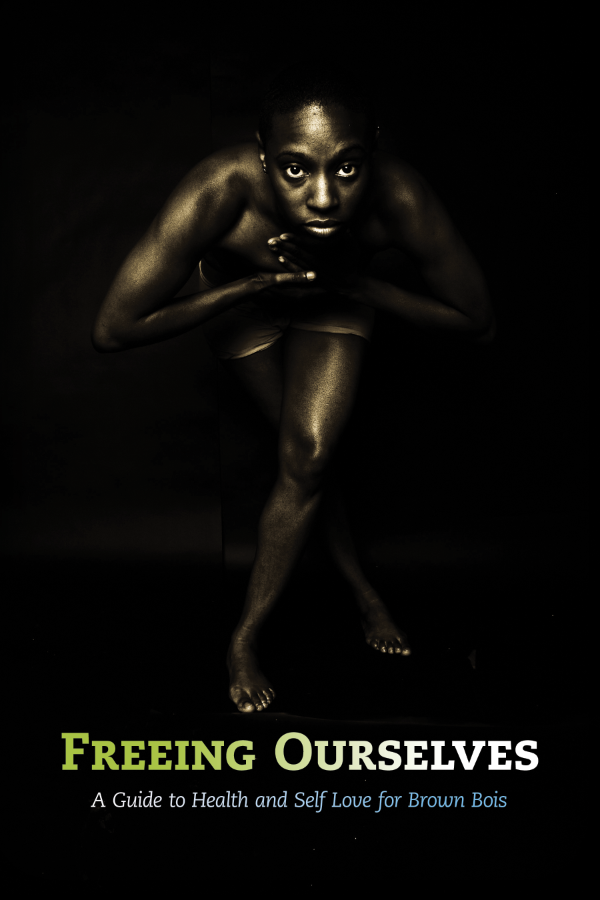Trans bodies should come with an owner’s manual.
That thought was likely the inspiration for Freeing Ourselves: A Guide to Health and Self Love for Brown Bois, an introspective health-focused guidebook by The Brown Boi Project, a collective of contributors committed to compiling that manual capably and in an engaging way. The Brown Boi Project describe themselves as a community of masculine of center womyn, men, two-spirit people, transmen and allies “who are committed to transforming our privilege of masculinity, gender and race into tools for achieving Racial and Gender Justice.”
It’s clear that a tremendous amount of commitment, care and artistic vision went into this book, which could be described as the fusion of the organic and sometimes edgy spontaneity and personal touch of testimonials and poetry that one would find in a ‘zine with a wealth of sage advice, professional design and stunning photography. While the authors of Freeing Ourselves acknowledge that their volume isn’t intended as a substitute for professional medical advice, the book does provide page after page of empowering conversation-starters on mental health, navigating the medical system, sex and body issues, different ways to navigate gender alignment for male-identified or masculine-of-centre trans people, and energy, diet and physical health. Fortunately, though, these conversation-starters don’t simply ask the questions and either abandon readers to them or dictate a one-size-fits-all solution — rather, they carry through in a way that usually provides enough direction for readers to answer those questions for themselves.
Freeing Ourselves is written first and foremost for trans-masculine, genderqueer and male-identified trans people, a group that is often otherwise invisible, face barriers and taboos in their quests and lack ready information. It is a reminder that the objective for trans and gender diverse communities is not always to cross entirely to the other side of the spectrums of sex and gender, but to shed expectations and to live as the person we need to be, wherever that may lead in the gender equation. For some, that path can mean legal transition, hormones, surgery and more; for others, the path can be very different, and still result in the physical, mental and spiritual alignment a person needs. To that end, The Brown Boi Project provides advice that is usually not touched on anywhere else. One notable exception where Freeing Ourselves falls short for the narrowest portion of its target audience is that it doesn’t go into great detail about transmale surgical options, which are sometimes the focus of energetic inquiry.
That said, Freeing Ourselves also has a wealth of information that transcends trans-anything. This includes some universally informative advice on finding and communicating with a health-care provider, dealing with sexual abuse or emotional trauma and drilling down to identify areas requiring personal change and planning to enact it.
The Brown Boi project is also born of racial and ethnic diversity, and as a consequence is acutely aware of the colonial means by which spiritual, emotional and psychological experiences have been invalidated and eradicated. As such, Freeing Ourselves has a cross-cultural approach that understands the interaction of trans and gender diverse struggles with those experienced by immigrants, indigenous peoples, people in poverty, those with disabilities and more. It approaches its conversation starters with novel thoughts on healing that includes acknowledging and (responsibly) using one’s privileges.
The book is also written with empathy for the way in which female-sexed bodies have been medicalized, and navigates self-actualization without committing to the rigid, stigmatizing and sometimes ill-equipped medical process as an exclusive option. This isn’t reflected as well in its section on mental health, where it raises many important questions addressing the emotional traumas trans people can experience, but then largely points to therapists as a solution, without a clear path for those who shun the mental health system or can’t afford it. But then, considering how diverse and divergent those questions can be, that is probably inevitable.
As a former testosterone-fuelled life form who was happy to shed many of the things the authors are embracing, Freeing Ourselves gets a bit button-pushing for me at times, but I recognize that as my own issue and not a failing of the authors. Beyond that, the book is modern, engaging and thought-provoking.
The Brown Boi Project includes contributors B. Cole, Erica Woodland, Sara Flores, Jacoby Ballard, Rachel Esquilin, Patricia Manuel and contributors, with visual design and photography by Corinna Nicole, Micah Bazent, Anthony Dimaano and Vay Hoang.—Mercedes Allen
Mercedes Allen is a graphic designer and advocate for transsexual and transgender communities in Alberta. Read her blog on rabble.ca and Dented Blue Mercedes.



